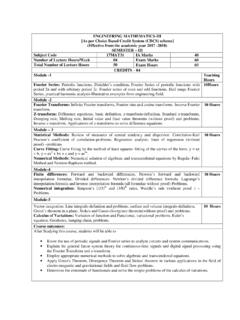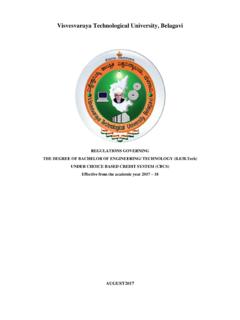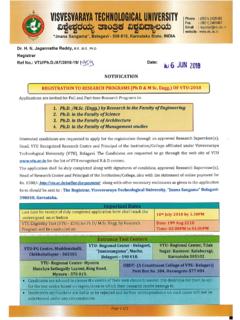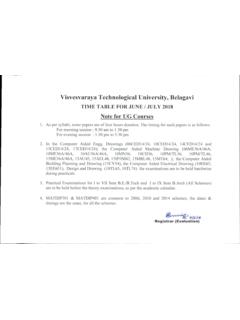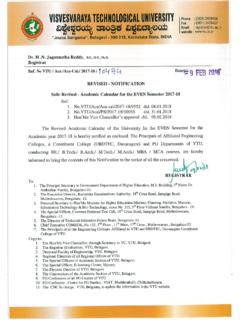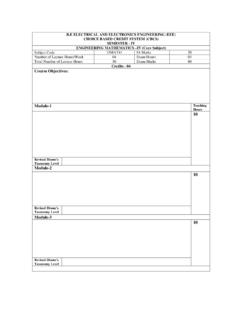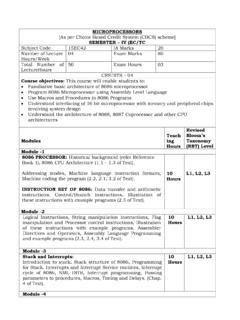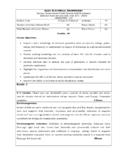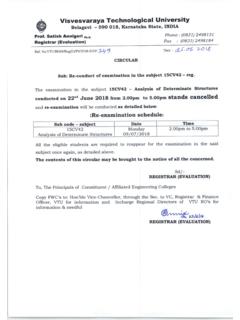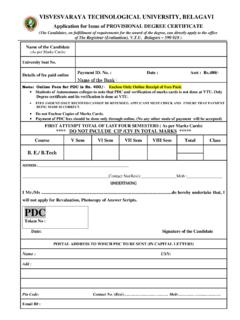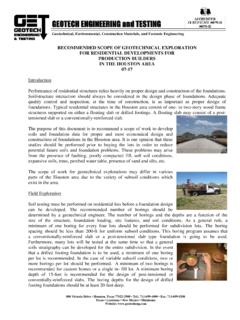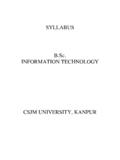Transcription of ENGINEERING MATHEMATICS-IV 15MAT41
1 ENGINEERING MATHEMATICS-IV [As per Choice Based Credit System (CBCS) scheme] (Effective from the academic year 2016 -2017) SEMESTER IV Subject Code 15 MAT41 IA Marks 20 Number of Lecture Hours/Week 04 Exam Marks 80 Total Number of Lecture Hours 50 Exam Hours 03 CREDITS 04 Course objectives: This course will enable students to Formulate, solve and analyze ENGINEERING problems. Apply numerical methods to solve ordinary differential equations. Apply finite difference method to solve partial differential equations. Perform complex analysis. Interpret use of sampling theory. Apply joint probability distribution and stochastic process. Module 1 Teaching Hours Numerical Methods: Numerical solution of ordinary differential equations of first order and first degree, Picard s method, Taylor s series method, modified Euler s method, Runge-Kutta method of fourth order. Milne s and Adams-Bashforth predictor and corrector methods (No derivations of formulae).
2 Numerical solution of simultaneous first order ordinary differential equations, Picard s method, Runge-Kutta method of fourth order 10 Hours Module 2 Numerical Methods: Numerical solution of second order ordinary differential equations, Picard s method, Runge-Kutta method and Milne s method. Special Functions: Bessel s functions- basic properties, recurrence relations, orthogonality and generating functions. Legendre s functions - Legendre s polynomial, Rodrigue s formula, problems. 10 Hours Module 3 Complex Variables: Function of a complex variable, limits, continuity, differentiability,. Analytic functions-Cauchy-Riemann equations in Cartesian and polar forms. Properties and construction of analytic functions. Complex line integrals-Cauchy s theorem and Cauchy s integral formula, Residue, poles, Cauchy s Residue theorem with proof and problems. Transformations: Conformal transformations, discussion of transformations: = , = , = +( / ) and bilinear transformations.
3 10 Hours Module 4 Probability Distributions: Random variables (discrete and continuous), probability functions. Poisson distributions, geometric distribution, uniform distribution, exponential and normal distributions, Problems. Joint probability distribution: Joint Probability distribution for two variables, expectation, covariance, correlation coefficient. 10 Hours Module 5 Sampling Theory: Sampling, Sampling distributions, standard error, test of hypothesis for means and proportions, confidence limits for means, student s t-distribution, Chi-square distribution as a test of goodness of fit. Stochastic process: Stochastic process, probability vector, stochastic matrices, fixed points, regular stochastic matrices, Markov chains, higher transition probability. 10 Hours Course Outcomes: After studying this course, students will be able to: Use appropriate numerical methods to solve first and second order ordinary differential equations.
4 Use Bessel's and Legendre's function which often arises when a problem possesses axial and spherical symmetry, such as in quantum mechanics, electromagnetic theory, hydrodynamics and heat conduction. State and prove Cauchy s theorem and its consequences including Cauchy's integral formula. Compute residues and apply the residue theorem to evaluate integrals. Analyze, interpret, and evaluate scientific hypotheses and theories using rigorous statistical methods. Graduate Attributes ENGINEERING Knowledge Problem Analysis Life-Long Learning Conduct Investigations of Complex Problems Question paper pattern: The question paper will have ten questions. There will be 2 questions from each module. Each question will have questions covering all the topics under a module. The students will have to answer 5 full questions, selecting one full question from each module. Text Books: 1. "Higher ENGINEERING mathematics " Tata McGraw-Hill, 2006.
5 2. B. S. Grewal, Higher ENGINEERING mathematics , Khanna publishers, 42nd edition, 2013. Reference Books: 1. N P Bali and Manish Goyal, "A text book of ENGINEERING mathematics " , Laxmi publications, latest edition. 2. Kreyszig, "Advanced ENGINEERING mathematics " - 9th edition, Wiley, 2013. 3. H. K Dass and Er. RajnishVerma, "Higher ENGINEERING mathematics ", S. Chand, 1st ed, 2011. SOFTWARE ENGINEERING [As per Choice Based Credit System (CBCS) scheme] (Effective from the academic year 2016 -2017) SEMESTER IV Subject Code 15CS42 IA Marks 20 Number of Lecture Hours/Week 04 Exam Marks 80 Total Number of Lecture Hours 50 Exam Hours 03 CREDITS 04 Course objectives: This course will enable students to Outline software ENGINEERING principles and activities involved in building large software programs. Identify ethical and professional issues and explain why they are of concern to software engineers.
6 Describe the process of requirements gathering, requirements classification, requirements specification and requirements validation. Differentiate system models, use UML diagrams and apply design patterns. Discuss the distinctions between validation testing and defect testing. Recognize the importance of software maintenance and describe the intricacies involved in software evolution. Apply estimation techniques, schedule project activities and compute pricing. Identify software quality parameters and quantify software using measurements and metrics. List software quality standards and outline the practices involved. Recognize the need for agile software development, describe agile methods, apply agile practices and plan for agility. Module 1 Teaching Hours Introduction: Software Crisis, Need for Software ENGINEERING . Professional Software Development, Software ENGINEERING Ethics. Case Studies.
7 Software Processes: Models: Waterfall Model (Sec ), Incremental Model (Sec ) and Spiral Model (Sec ). Process activities. Requirements ENGINEERING : Requirements ENGINEERING Processes (Chap 4). Requirements Elicitation and Analysis (Sec ). Functional and non-functional requirements (Sec ). The software Requirements Document (Sec ). Requirements Specification (Sec ). Requirements validation (Sec ). Requirements Management (Sec ). 12 Hours Module 2 System Models: Context models (Sec ). Interaction models (Sec ). Structural models (Sec ). Behavioral models (Sec ). Model-driven ENGINEERING (Sec ). Design and Implementation: Introduction to RUP (Sec ), Design Principles (Chap 17). Object-oriented design using the UML (Sec ). Design patterns (Sec ). Implementation issues (Sec ). Open source development (Sec ). 11 Hours Module 3 Software Testing: Development testing (Sec ), Test-driven development (Sec ), Release testing (Sec ), User testing (Sec ).
8 Test Automation (Page no 42, 70,212, 231,444,695). Software Evolution: Evolution processes (Sec ). Program evolution dynamics (Sec 9 Hours ). Software maintenance (Sec ). Legacy system management (Sec ). Module 4 Project Planning: Software pricing (Sec ). Plan-driven development (Sec ). Project scheduling (Sec ): Estimation techniques (Sec ). Quality management: Software quality (Sec ). Reviews and inspections (Sec ). Software measurement and metrics (Sec ). Software standards (Sec ) 10 Hours Module 5 Agile Software Development: Coping with Change (Sec ), The Agile Manifesto: Values and Principles. Agile methods: SCRUM (Ref The SCRUM Primer, Ver ) and Extreme Programming (Sec ). Plan-driven and agile development (Sec ). Agile project management (Sec ), Scaling agile methods (Sec ): 8 Hours Course Outcomes: After studying this course, students will be able to: Design a software system, component, or process to meet desired needs within realistic constraints.
9 Assess professional and ethical responsibility Function on multi-disciplinary teams Use the techniques, skills, and modern ENGINEERING tools necessary for ENGINEERING practice Analyze, design, implement, verify, validate, implement, apply, and maintain software systems or parts of software systems. Graduate Attributes Project Management and Finance Conduct Investigations of Complex Problems Modern Tool Usage Ethics Question paper pattern: The question paper will have ten questions. There will be 2 questions from each module. Each question will have questions covering all the topics under a module. The students will have to answer 5 full questions, selecting one full question from each module. Text Books: 1. Ian Sommerville: Software ENGINEERING , 9th Edition, Pearson Education, 2012. (Listed topics only from Chapters 1,2,3,4, 5, 7, 8, 9, 23, and 24) 2. The SCRUM Primer, Ver , Reference Books: 1.
10 Roger S. Pressman: Software ENGINEERING -A Practitioners approach, 7th Edition, Tata McGraw Hill. 2. Pankaj Jalote: An Integrated Approach to Software ENGINEERING , Wiley India Web Reference for eBooks on Agile: 1. 2. DESIGN AND ANALYSIS OF ALGORITHMS [As per Choice Based Credit System (CBCS) scheme] (Effective from the academic year 2016 -2017) SEMESTER IV Subject Code 15CS43 IA Marks 20 Number of Lecture Hours/Week 04 Exam Marks 80 Total Number of Lecture Hours 50 Exam Hours 03 CREDITS 04 Course objectives: This course will enable students to Explain various computational problem solving techniques. Apply appropriate method to solve a given problem. Describe various methods of algorithm analysis. Module 1 Teaching Hours Introduction: What is an Algorithm? (T2 ), Algorithm Specification (T2 ), Analysis Framework (T1 ), Performance Analysis: Space complexity, Time complexity (T2 ). Asymptotic Notations: Big-Oh notation (O), Omega notation ( ), Theta notation ( ), and Little-oh notation (o), Mathematical analysis of Non-Recursive and recursive Algorithms with Examples (T1 , , ).
